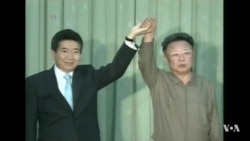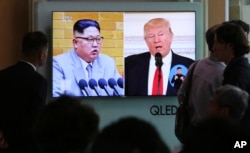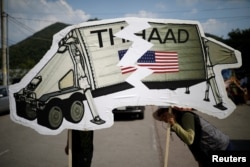This week’s summit between North Korean leader Kim Jong Un and South Korean President Moon Jae-in, to be held on Friday, April 27, is expected to produce a denuclearization framework that U.S. President Donald Trump could support when he meets with Kim in May or June.
The North’s reassuring outreach of late, including its decision to unilaterally suspend all nuclear and missile tests, has set an optimistic tone that a deal can be reached. But it is still unclear if real progress toward peace can be achieved.
Past summits
There have been two past inter-Korean Summits in 2000 and 2007, both held in the North. The first produced a joint peace declaration promoting humanitarian exchanges and economic cooperation.
From the second came support for a permanent peace treaty and a U.S. and China-led deal to end Pyongyang’s nuclear weapons program for economic assistance and security guarantees.
WATCH: Upcoming Korea talks
However, North Korea’s continued nuclear development efforts and missile tests, in violation of past agreements, and other hostile acts, including a alleged deadly attack on a South Korean naval ship in 2010, brought an end to any progress made at these summits.
Optimistic signs
Leading up to this week’s inter-Korean summit, there are encouraging developments that a nuclear deal may again be within reach.
U.S. President Donald Trump’s maximum pressure campaign, that led efforts to impose harsh international sanctions ending most North Korean exports, are exerting increasing economic pain that could be pressuring the leadership in Pyongyang to actually give up its nuclear arsenal this time.
"If the situation continues, the foreign exchange could be depleted and North Korea can face a very serious situation at the end of this year. This is one of the reasons why it has come out in favor of dialogue," said Cheong Seong-Chang, a senior North Korea analyst at the Sejong Institute in South Korea.
North Korean leader Kim Jong Un has made a number of concessions already by agreeing to talk about denuclearization without conditions, by appearing to drop past demands that the U.S. end its military presence on the Korean peninsula, and most recently by announcing the suspension of nuclear and missile tests, and closure of the country’s nuclear test site.
However it remains unclear if this time around North Korea will keep its denuclearization promises or is just trying to ease international pressure by agreeing to a temporary nuclear freeze or to marginally reduce its nuclear and missile arsenal.
"We cannot be sure as to whether North Korea is going to truly denuclearize, or if it is engaging in the U.S.-North Korea summit in an attempt to get around its isolation temporarily," said Lee Sang-Hyun, a North Korea analyst with the Sejong Institute and former adviser to the South Korean Ministry of Foreign Affairs.
While welcoming North Korea’s unilateral concessions, President Trump on Sunday expressed caution with a Tweet saying, "We are a long way from conclusion on North Korea, maybe things will work out, and maybe they won’t - only time will tell."
North Korea is estimated to have approximately 30 nuclear weapons, hundreds of medium and long-range missiles, and has been continuing to produce fissile material at both its nuclear reactor in Yongbyong and in hidden uranium enrichment facilities.
Even if Pyongyang agrees to a nuclear deal, analysts say it could take years to negotiate verification details, access for international inspectors, and to complete the dismantlement process.
Inter-Korean relations
South Korean President Moon Jae-in has played a key role in brokering a new nuclear deal and said North Korea expressed a willingness to pursue "complete denuclearization" during preliminary talks.
The progressive leader has supported tough U.S. measures, including the deployment of the U.S. THAAD missile defense system in South Korea, and backing the U.S. led sanctions again North Korea. At the same time he has pursued improving inter-Korean relations by facilitating the North’s participation in the recent winter Olympics.
On Monday, South Korea halted the propaganda broadcasts it blares across the border at North Korea to create a more friendly atmosphere in advance of the Moon-Kim meeting.
At the summit Moon expects a deal to resume humanitarian exchanges and family reunions, and to renew efforts to replace the armistice ending the Korean War with a peace treaty, that would also require the approval of the U.S. led United Nations forces and China.
However Moon is not expected to endorse increasing economic cooperation that would violate U.N. sanctions, or confront Kim about alleged human rights violations committed by his repressive government.









